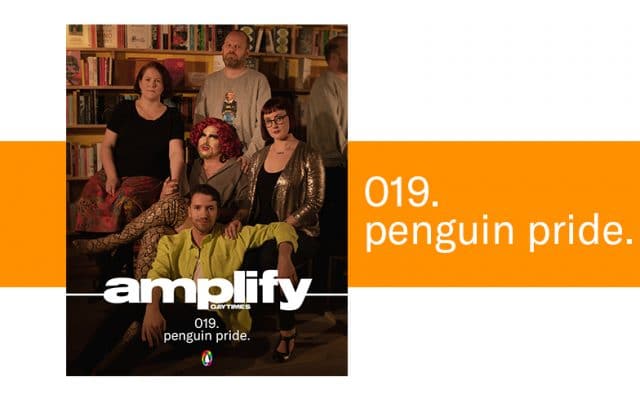
Never has the zeitgeist, had, or made such room for us to tell our queer stories, in our own words, and in such a variety of styles and a diversity of voices. I had the opportunity to sit down for a incredibly broad and inspiring discussion with some of Penguin’s magnificent new queer authors, discussing everything from the films and literature that informed their lives and their art today, to sex education and how they carved out their own storytelling niches, to what transformative effects they want their words to have on the people that read their books today.
Paul Flynn, a gay veteran pop-culture journalist by trade, is the author of Good As You – a nonfiction, pop-cultural road to British gay equality, emerging in the atmosphere of 1984’s Bronski Beat gay anthem, Smalltown Boy and spanning the bumpy, heroic journey to 2014’s landmark marriage equality bill.
Kirsty Logan is a Glasgow-based author with her subject matter often rooted in magical realism, fantasy romance. Her most recent book is The Gloaming, a queer, mermaid love story set on a Scottish island that turns people to stone, and her upcoming Things We Say in the Dark, a book of short feminist horror stories, is set for an October release.
Emma Morgan is the debut novelist behind A Love Story for Bewildered Girls, a beautiful piece of fiction that emerged from Penguin’s Write Now diversity scheme. It follows the trials and triumphs of three women blossoming into love, adulthood and navigating queer identity.
Dominic Evans, who works under the pen name DOM&INK, is a queer illustrator, author and self-styled merman. His latest book, Free to Be Me, is an interactive LGBTQ illustrated journal for young people 12 and up to, in his words: “find that inner rainbow, have some self love and take some pride in themselves.”
Tom Rasmussen A.K.A. Crystal Rasmussen OBE, the night-crawling, millionaire-marrying, crocodile-skin-thigh-high-wearing, chanteuse. A sort of jill of all trades (and mistress of many more), author of Diary of A Drag Queen, an unabashedly queer, sexy metropolitan romp, equal parts glamour, filth, revolting and revolutionary.
These writers are a beautiful illustration of what joys and futures we can conjure when we are finally given the means and the platforms to tell our stories and share our truths with the world.
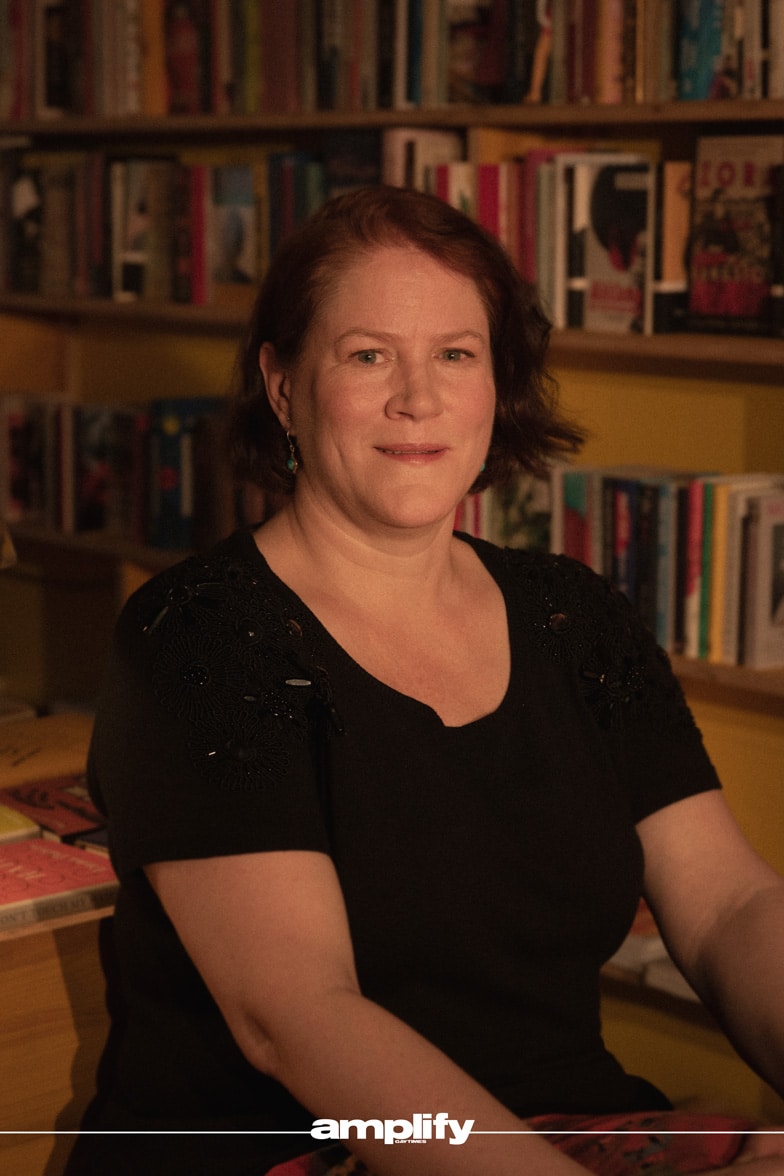
Why did you all write your respective books?
Dom: I remember thinking wouldn’t it be great if there was a journal where the reader, whether they’re coming out or they’ve come out or they don’t know [that they’re LGBTQ], they could put an imprint of their identity into the book, and kind of be guided through [their awakening] and be reassured that it’s normal. And I wanted to make the book as diverse and inclusive as we could. There wasn’t anything like it [out there]!
Emma: Having written it, I realized that I was, like you said, writing a book for my younger self. Because [it wasn’t] until I was 28, that I had a relationship with a woman for the first time. And I realized that these characters were all sort of around 28/30. But I hadn’t clocked that at all. So that surprised me when I look back on it and I realized what I’d done. I wanted to tell a story that wasn’t just from one side or another that included everybody. I couldn’t seem to find anything that was both gay and straight, at the same time, they seemed stuck in little boxes. Nobody was telling a story that told everybody’s story, or [a more mainstream version of everybody’s story.]
Crystal: In these pages, I wanted my fans — otherwise known as every living thing on earth, otherwise known catchily as the Crystal-hive — to get a real insight into what it takes to be me. Into what it takes to live life outside the lines, in a place where many misunderstand you, while also wanting to use you for your image, your culture, your thinking, your fabulous.
I’m sure you hear this all the time Crystal but you are truly, deeply inspirational!
Crystal: That’s so sweet my dove, but also so true – I can’t help that I’ve been bestowed with a kind of godliness some have compared to Jesus. I just want to do right by it.
Paul: It was a little bit of a midlife crisis, actually. As soon as I got into my 40s. [As a journalist], LGBTQ culture has formed a sort of backbone of all the work that I’ve done. And as I found out, when I when I sort of collated everything that I had been doing, I had been there for for a lot of that journey towards LGBTQ equality. However, what I tended to see was, there was a lot of stories coming through that positioned – and this is from the best intentions and these stories need to be told as well – but they positioned gay men as victims. So you end up with the with the awful stuff about being gay, the homophobic assaults, the chemsex and addiction. Because negative experiences are newsworthy, and I wanted to tell experiences that were positive but, more importantly, that were that were tinged with heroism as well. I wanted to find that towpath in the journey from victimhood to heroism. For younger readers, I was wondering, “Where are the gay heroes?” Little straight boys grow up and look at footballers as they look heroism everywhere. Little straight girls look at Disney princesses. They’ve got them everywhere. The gay kids [don’t get to have them in the same way].
I want to take it back a bit. What were your early, formative experiences of queer literature, and how have they influenced your own writing as well as your own perceptions of queer culture as well?
Crystal: I was never a big reader growing up – where I’m from, Lancaster by way of Russia pre Bolshevik revolution – books weren’t of huge cultural importance. But I love Belle De Jour, Secret Diary of a Call Girl. I don’t think it’s the most stellar representation of sex work, but it’s honest, and sexual, and taboo breaking. That’s why I was attracted to the diary format. It’s a space to be honest, which I think is a killer antidote to shame – something I’ve worked my whole life to escape. Now I love writers like Michelle Tea and Audre Lorde, but back then on a sun lounger in Benidorm it was Belle.
Paul: Mine was the worst ever! In pretty much every family house, in Manchester when I was growing up, there was a Moors murders book…
Dom: We had one!
Paul: It was this local crime that hung over everything in our in the neighbourhood. So everybody had a copy of [a book about it]. Mine was called The Devil’s Disciples. And you weren’t told to read it, but it was like the cautionary tale that sort of teenagers would go to. In the book, which was written by the chief investigating officer of the crimes, there’s a bit where Ian Brady picks up [his victim] in Piccadilly station toilets while cottaging. This was definitely the first [queer] thing I read. I would’ve been like 11 years old. Because the kids were so young, it was thought of as like…
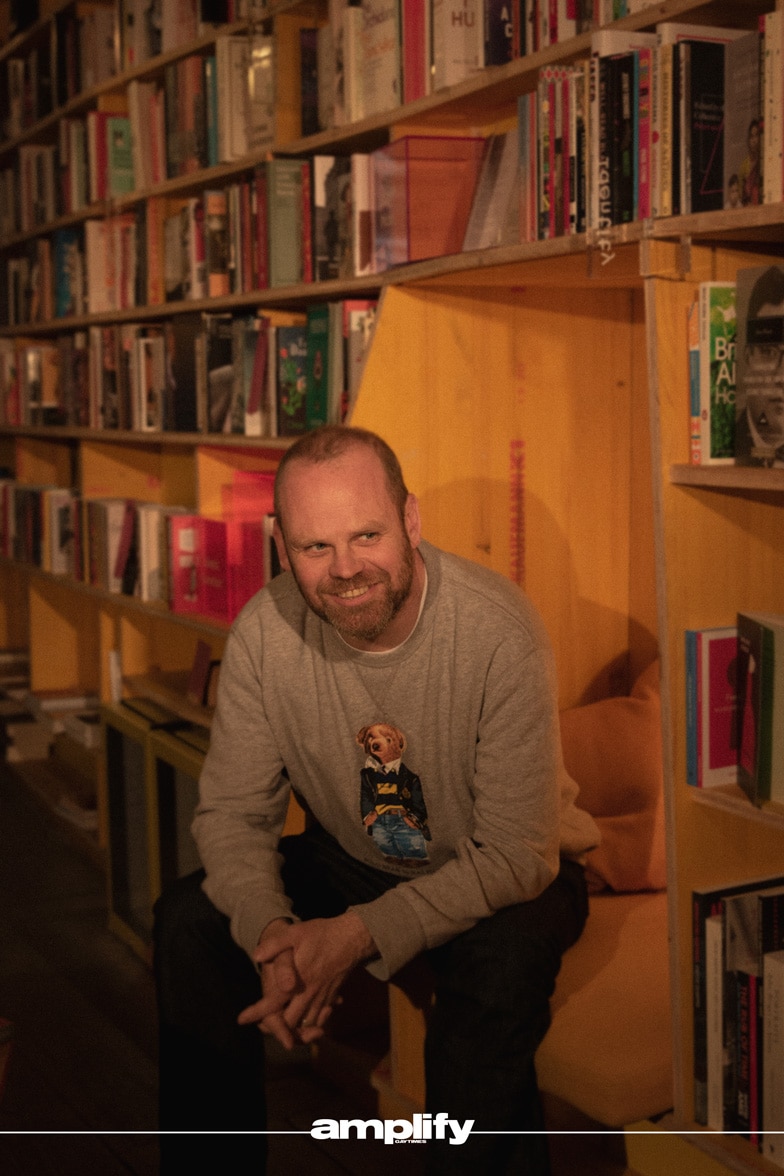
A cautionary tale…You become homosexual, you turn into a murderer!
Paul: It’s almost what [was implied]. The next thing that I read about homosexuality in literature was the The Orton Diaries, which was much [better]. It’s still my favourite book, I love Joe Orton, I think he was an incredible figure. But this was again a lot more tantalizingly told stories of sordid toilet sex and cruising and this and the other. I was about 15 when I was reading that and, of course, he ends up dead as well. Basically my inception into gay literature was people cottaging and ending up murdered… I think there’s a direct relation been reading those as a kid and wanting to write a book where people don’t end up murdered, [there’s heroism and there’s joy], and everything is not illicit.
Kirsty: In older fiction about lesbians, there was a trope where one of them has to die or go mad in the end! And I genuinely don’t think that the authors were doing it on purpose. I think they just could not conceive a situation where two women ended up happy. And that actually made me very determined. So while a lot of my fiction gets very, very dark, I’m never going to end a novel with one of the two women dying. I’m not going to contribute to this fucking trope that I hate, that I had to read when I was a kid! Because I found everything I read as a teenager, either they died or went mad, or it was coming out stories. So there’s always coming out stories. And it would be like teenage girls were in love with each other and they would come out, but the story would end when they came out. And then it was like, well what then? My coming out was very undramatic, like my parents were fine with it and nobody really gave me shit for it. So I just remember thinking well what am I supposed to do now!? In no books, did it go past the [coming out].
Emma: Oranges Are Not the Only Fruit was my first ever contact that I had with lesbian love. Actually I think I was more influenced by a film, My Beautiful Launderette, and they kiss in the launderette and I’m like ‘What?!’ I come from a really conservative community. I come from Guernsey, and I didn’t know about gay culture or gay life, and they were kissing. I found it amazing! It blew the top of my head off that such things were even possible. It was amazing.
There are loads of divisive conversations going on on social media right now to do with LGBTQ people, sex, and sex education. Some of those have been about Pride, with some Twitter users suggesting people should keep their kinks away from Pride, and almost sanitise their sexual expression there, to keep the event family friendly. Moreover, queer sex is often censored, and queer sex between women is often particularly badly represented in the media. I was wondering what you thought about all of this and about the necessity of representing queer sex in your writing and in your stories?
Crystal: Personally I think it’s worse to have children than it is to have sex, but when push comes to pull the two aren’t mutually exclusive – one actually produces the other remember. I think it’s absurd anyone would suggest that about Pride, and the very root of the world’s hatred against people like us is the way we have sex. So we must be honest about it, because there’s nothing wrong with it. You want a baby – fine – I want to get fisted, what’s the issue? The book is very cavalier about sex, properly honest, and it explores the relationship between loads of types of sex and shame, love, power, money. I spent a lot of time thinking getting bummed was bad, but turns out it’s actually bloody stunning as long as you’ve got lube. It’s time we all just calmed down, really.
Kirsty: There are so many films that I’ve watched where I think ‘Women do not have sex like that!’ It doesn’t work! It’s not the way that vaginas are. It was important to me to show that you can be queer in other ways, other than just having sex with someone. So in my first novel, in particular, there wasn’t an explicit sex scene, I think it was so obvious that it is a love story. The whole book is a journey for them to kind of come together. They literally have to traverse geography to be together. And when the offers came in for it, one of the editors was like ‘I just love the friendship between…’ There’s a difference between a friendship and a relationship. Anyway, so then it was the next book where I was like, ‘Well, that is not gonna happen again.’ So I wrote many sex scenes, including a period sex scene. It’s a very tender [scene]. It’s not like she gets her period and is horrified, it’s fine. I think it’s important to acknowledge that sex is a part of not everyone’s relationship, but it’s a part of many people’s relationships, but also, it’s only really a small part of the percentage of your day.
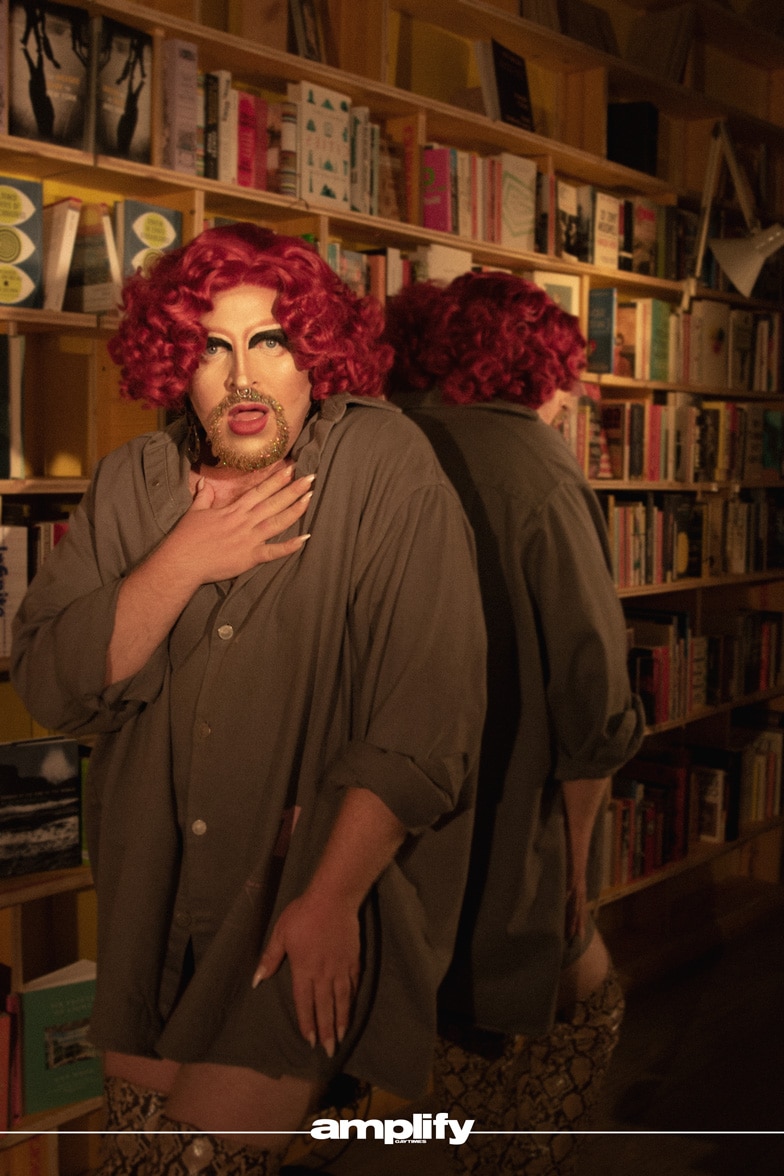
Emma: [Publishers] said, ‘We want to know what it’s really like!’ I think I’m quite a shy, private person, so when they said that it made me draw back and I think I could have put more sex in it. And in a way, I’m sad about that. There are sex scenes, but they’re not very dramatic sex scenes. They’re quite sort of quiet, shy, tender scenes, which is also you know, [realistic].
That’s the way some people have sex.
Emma: And it’s perfectly valid, but because they’ve said that to me, I think I maybe went in the other direction. And I didn’t want it to be titillating to [cis straight] men. There was something in the back of my head about that. And I found that difficult to do as a result. I thought I don’t want men skipping through. ‘Oh, I’ve heard it’s on page 93!’ Maybe I shouldn’t have thought like that. Maybe I should have just thought, ‘Right this is what I’m going to do!’
Kirsty: [I think that you should just make it] what you think is hot. Because I write erotica as well. And I just try and write like, what I think is sexy. And then I don’t know, straight guys think it’s sexy I don’t really care. But I wouldn’t ever [alter it for their gaze]. I’ve been thinking about it because I’ve started just playing with some screenwriting stuff. And already I’m trying to think, someone could really mess with this because like, I think I’ve written the script in a way that’s very tender and loving and isn’t kind of physically exploitative of women. But this is just the blueprint. Someone could be like,’This scene, we’ll zoom in on the boobs! And then they’ll do this! And then they’ll lick each other’s tongues!’
Paul: Yeah, absolutely. And you become so particular about what you’re [creating]. One thing I was thinking about was sex in gay literature. There’s an amazing moment when Alan Hollingurst won the Booker Prize for The Line of Beauty, the headline on The Daily Express the following day was ‘GAY SEX WINS BOOKER PRIZE’. It was the front cover headline. Hollinghurst talks a lot about how much he loves writing [sex scenes] and I know that he found that absolutely hysterical. But it’s quite a good sort of change of times. It’s like, you can’t imagine that headline existing now. I think you are free to do that in a way that didn’t exist, even as short ago as the early noughties. He was seen as being [this great provocateur]. It’s actually no more provocative than Brideshead Revisited.
I find it really interesting because I think most most mainstream straight culture thinks that queerness is just about sex, which is why we’re having these arguments about what schoolchildren are being taught about LGBTQ people. If you look across the board, not a single one of the syllabus is teaching primary school children how to have queer sex.
Crystal: To be honest I was quite culturally isolated as a child, because I’m the lost Romanov girl, but also because I didn’t read or seek out gay or queer culture. It was nowehere to be seen. There was just me alone listening to Celine Dion, then being bullied at school for being gay. I think people were aware of gayness but it was never ever a good thing, a normal thing, it was always a horrendous site of bullying. I think I was so caught up in obsessively trying to survive. So yes, sex and LGBTQIA+ education in schools would save lives literally. Because I didn’t understand myself until I left, then I encountered lost of different types of queerness expressed differently because of different people’s backgrounds. But my priority was staying alive and being myself.
Paul: I wish [all of this] would be pointed out in the news. I feel like the reporting of it is so wrong, because nobody’s actually saying [to primary school kids this is how you have anal intercourse]. It’s just about acknowledging existence.
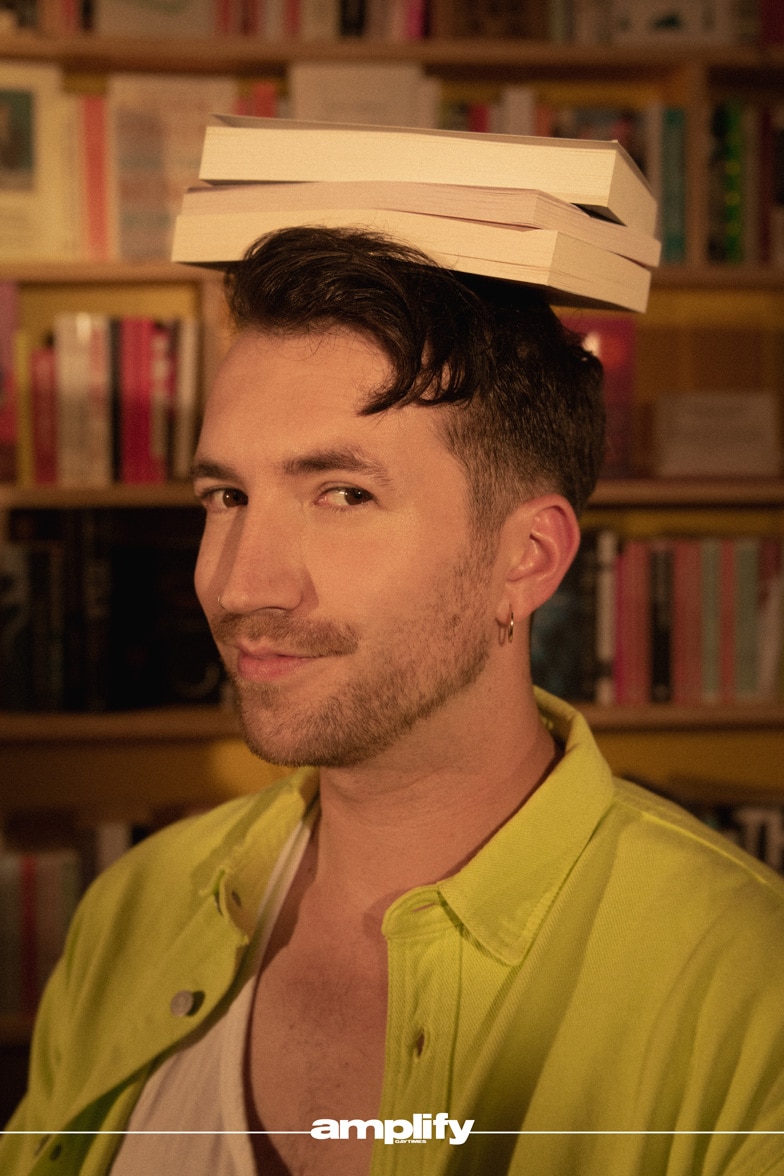
It’s about acknowledging different kinds of people, different modes of living, different kinds of family, different kinds of relationships.
Kirsty: And children absolutely do not struggle to understand that! [To] my nephews, I’m Auntie Kirsty, and they have never at any point been like, ‘Why is Auntie Annie married to Aunty Kirsty?!’ They’re just like, ‘Grownups get married.’
Dom: When I originally conceived the idea of Free To Be Me, I [wanted] to bring up sex, because I think it’s actually quite important. I remember when I was growing up, I had no point of reference. And this lad at college gave me a VHS with some German porn on. I went home thinking it was like X-Men, and I’m surprised because literally my first reference to gay sex on the screen was these German soldiers. One was chopping some potatoes and then they did it on a truck! I remember thinking, ‘I’m so glad my first time [wasn’t like that!]’ I wish there was something when I was 16 or 17 that kind of covered that. And I know with Free To Be Me we really wanted to do it. But we just didn’t have the space. Juno Dawson’s This Book Is Gay is really good, because that does cover quite a bit of stuff for teens. But I would love to do it for [a slightly older] age range.
Kirsty: I think what was missing about learning about queer sex for me as a teenager was the tenderness of it. You would look at some porn and be like, ‘I guess that’s how you do it.’ But I remember looking at porn and thinking it doesn’t look very fun. Because obviously [lesbian porn] was made for straight men. A friend of mine at uni only came out when he got there because as a young teenager another boy in his school told him that the way that gay men have sex is that they shit on each other’s chests! And then he was like, ’I don’t want to do that, so I guess I’m not gay.’ And it was really confusing, because he wanted to kiss boys, and go on dates with boys. That was really sad. He didn’t understand that gay men [could] be tender and love each other.
Paul: You get that tenderness in film sometimes. I always have Beautiful Thing as the one reference point. That’s absolutely year zero for gay storytelling.
Dom: That was my first ever proper gay film!
Paul: It’s the sort of council estate Romeo and Romeo.
Dom: It actually gave me hope that this is something that’s been made years ago, and it’s a film and it was out there and people watched it in cinemas. So it must be popular. That means people accepted and liked it.
Paul: It’s such an important piece. It’s the one thing that I would encourage every baby gay to watch, and I love the fact that it’s working class as well. I mean, it’s not like some some fucking fancy E.M. Forster novel, where a posh boy fucks the gardener. I genuinely thought when I saw Maurice at the cinema that being gay was something for posh people to do to common people, and then something like Beautiful Thing comes along. It’s been so influential of every UK soap opera storyline that has a gay character.
If you were going to recommend one piece of queer literature to somebody, an absolute fail safe classic, what is the one book you think everybody should read?
Dom: I think for me, mine actually is more recent. I would probably recommend this to every little LGBTQ person growing up. It’s Heartstopper by Alice Oseman. It’s a graphic novel about two boys at school, and they fall in love. Their parents don’t reject them. They don’t fall out. And it’s just a really nice, easy to read, beautifully illustrated book.
Kirsty: The queer representation in graphic novels lately is great. But there was one that I was so surprised by. It’s by Meredith McClaren, and it’s called Super Fun Sexy Times. It’s superhero erotica, but a graphic novel. It’s so good. I didn’t know that I wanted that, and then I got it. It’s got a great variety of different body types, different types of relationships. I also love Water Snakes by Tony Simon, which is really weird but really good. And then obviously Lumberjanes. I’m actually going to pick another quite new one as well, which is a poet called Cynthia Blackwell. She’s got a few collections of poetry out and they’re just really beautiful. She’s got some really, really beautiful love poems.
Paul: Dancer From the Dance by Andrew Holleran. I just think it’s the most perfect piece of literature. It’s New York in the 70’s. One man’s difficult passage to coming out. That period of pre-AIDS New York and Fire Island is just incredible. It is almost a historical document now, but the fact that the two central characters still just really resonate. They blossom with every shade of the gay sensibility, from the very best to the absolutely most despicable and it’s just a perfect book. I bought the first edition of it, and still buy it as everybody’s birthday present. I read it again last year, and I thought it’s still so easy to see yourselves in these characters now. It’s an absolute masterpiece.
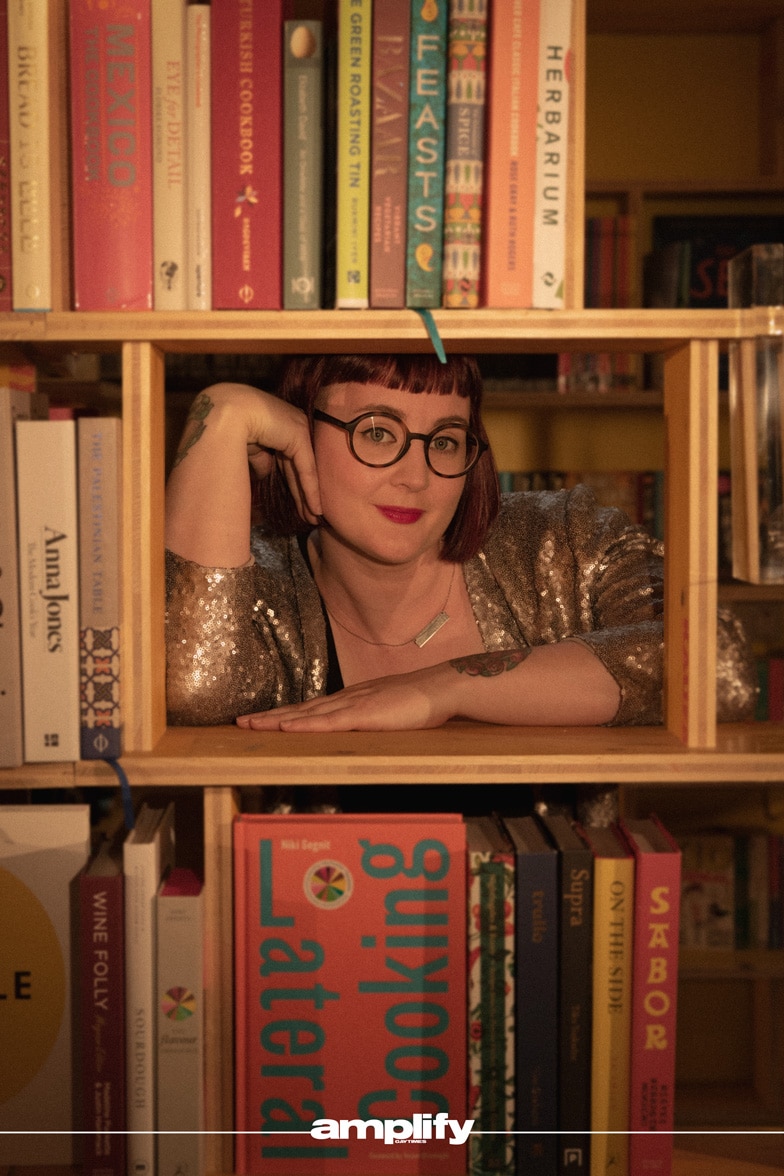
So I have one final question. Now you’ve all put your work out into the world, and people are going to read this they’re going to take things from it, and they’re going to create their own work. What kind of world do you want the work you’ve made to create and what do you want to see come from what you’ve made?
Crystal: To be nominated for a Grammy for the audiobook, an Oscar for the costume, a Nobel Prize for Literature for the first page, the McArthur Genius Grant for the cover, a Nobel Peace Prize for the peace, and a Razzy for my performance in the movie, is not an honour. It’s a God given right! But seriously, I’ve had messages where people have given it to their parents or told me they read it repeatedly to feel less alone. That’s literally all I wanted because I felt and feel really alone. Good books should allow you to both see yourself and to escape, and that was my intention with Diary of a Drag Queen. To provide queer people with a place to be seen, and to provide non queer people with a place to learn more about something mass culture has barely scratched the surface of.
Dom: I feel there’s a growing space in terms of queer literature and non-fiction that’s out there, that’s getting bigger and brighter. And it feels like all these books are going into a place where the generations that are growing up are going to be really woke and really loved and very accepted. That’s all I like to think: they’re gonna eat these books up and share them, spread them, love them, put their identities in them, and learn from them. And help them educate others about LGBTQ rights and equality, self acceptance, and love.
Kirsty: Well, I personally think it’s really important for me to leave the door open, leave the light down. Because I’m very conscious that I am surprisingly mainstream. I’m very conscious that I am a safe ‘other’. So I am Scottish, but only a little bit Scottish. I’m queer, but only a little bit queer. I’m sort of tattooed but only a little bit tattooed. And I understand that to mainstream publishers, this is nice because they get to tick the diversity box. But I’m white middle class, I’ve got a nice marriage, I’ve got a dog, I’m very conscious of that. It’s not in any way false. That’s who I am as a person. I am aware that that makes me palatable and makes me safe. So I feel like it’s really, really important for me to help the voices of people who will be more ‘other’ than I am, who will find it a lot harder to come into the [industry]. What I’m trying to say is, I think even if we have the best will in the world, we go for what’s familiar, we like to be around people who are like us. And people in publishing are no different to people at the BBC or whoever, no different. They want to be around people who they find easy to connect with, who are similar to them. So I feel like that the most important thing that I can do with my own work is to help others, maybe people who are genderqueer, people who are working class, people who aren’t white people who would not necessarily be accepted so easily into that world. So I think it’s really important for me to try and amplify other people’s voices and help them out in any way that I can.
Emma: I’m going to go with Kirsty’s answer!
Paul: Lots of weird and wonderful things have happened. One is that it’s currently – touch wood – being optioned for a documentary. Little personal things happened as well. After the book came out, an English teacher got in touch with me from Manchester Grammar School and he said, ‘I’m going to have this in my humanities class and I’m going to teach it.’ It was amazing. I did a literary festival in North Yorkshire, near where my sister lives, and she brought all her kids. And they all came along and sat and watched us talking about gay history. All these things that I’d never had as a kid. And the eldest, who was 17 said he bought it for his gay friend at school. That’s everything I ever wanted.
Emma: The stories we tell are really important. You need to know that you’re not alone. You need to know that whatever you feel, whoever you fancy, whoever you love is normal. And you don’t have to worry about it. You don’t have to get stressed or hate yourself. And if my book does anything at all, to contribute to that sort of feeling then I go home happy.
Photography Hidhir Badaruddin
Words Otamere Guobadia
Makeup Tom Fraser using MAC Cosmetics
Photography Assistant Delali Ayivi







